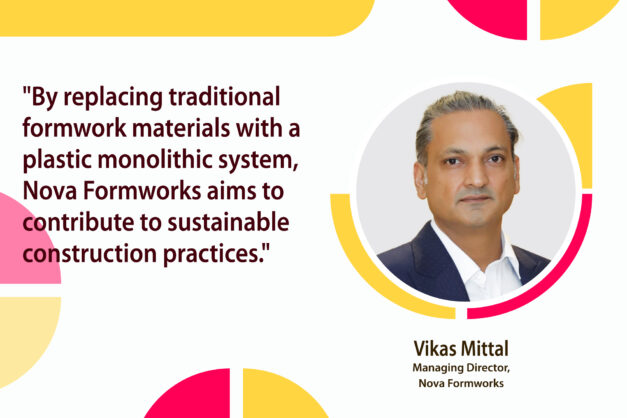Innovations in formwork and prefabrication revolutionise construction techniques by providing effective, economical, and ecologically friendly solutions. These methods transform the construction industry, offer adaptability, and promote sustainability.
“By replacing traditional formwork materials with a plastic monolithic system, Nova Formworks aims to contribute to sustainable construction practices.”
From your perspective, what innovative strategies or methodologies can be employed to optimise resources and minimise waste?
Implementing advanced formwork technologies such as reusable modular systems can significantly optimise resources and reduce waste in construction. Prefabricated formwork components, made from durable materials like Plastic or aluminium, allow for easy assembly and disassembly, promoting their repeated use across multiple projects. Digital tools like Building Information Modeling (BIM) enable precise planning and minimise material overages and waste. Additionally, adopting lean construction principles emphasises efficient resource utilisation by streamlining workflows and reducing excess inventory. Integrating environmentally friendly materials, such as recycled or sustainable formwork options, further enhances sustainability. Overall, a holistic approach involving advanced technologies, digital planning, lean methodologies, and eco- friendly materials can optimise resources and minimise waste in the construction process, particularly in formwork usage.
The recently introduced deck system for slabs has garnered significant attention. Can you elaborate on the unique features of this system and how it addresses the needs of industry?
The recently introduced deck system for slabs revolutionises construction by offering a modular and versatile solution. Its key feature lies in interlocking prefabricated slabs seamlessly connecting, streamlining installation and reducing construction time. This system enhances efficiency, allowing for rapid assembly without compromising structural integrity. The deck system accommodates diverse architectural designs, providing flexibility in construction projects. Its innovative design promotes sustainability, as the prefabricated slabs can be reused, minimising waste. Additionally, the system’s adaptability to various environments and load-bearing requirements caters to the dynamic needs of the construction industry. Overall, the deck system stands out for its efficiency, versatility, and eco-friendly attributes, making it a compelling choice for modern construction practices.
The creation of a complete plastic monolithic formwork system is an exciting development. How does Nova Formworks envision this system transforming construction processes?
Nova Formworks envisions its complete plastic monolithic formwork system revolutionising construction processes, especially in monolithic construction segments. This innovative system, characterised by its durability, lightweight design, and reusability, promises to accelerate construction timelines and reduce costs significantly. The seamless integration of the formwork system ensures a monolithic structure, enhancing structural integrity and minimising potential issues. Its modular and user-friendly nature facilitates easy assembly and disassembly, streamlining workflows and promoting efficiency on construction sites. By replacing traditional formwork materials with a plastic monolithic system, Nova Formworks aims to contribute to sustainable construction practices while maintaining high standards of quality and precision. This transformative approach addresses construction challenges and sets a new standard for speed, cost-effectiveness, and environmental consciousness in monolithic construction.
Off-site construction and prefabrication are gaining popularity. How do you foresee these methods impacting traditional construction practices, and what implications might they have for formwork systems?
The rising popularity of off-site construction and prefabrication is poised to revolutionise traditional construction practices. These methods streamline processes, enhance efficiency, and reduce construction timelines. Prefabrication allows for precision in controlled environments, minimising errors and waste. Consequently, on-site work is expedited, lowering labour costs. In this context, the role of formwork systems is likely to evolve significantly. Traditional formwork methods may give way to modular, reusable systems that align with prefabrication needs, offering flexibility and cost-effectiveness. Moreover, off-site construction’s reduced reliance on in-situ concrete casting may lead to innovations in formwork design tailored to specific prefabrication requirements, transforming the industry’s landscape towards sustainability and efficiency.
Nova Formworks is participating in Excon 2023. What can attendees expect from Nova Formworks at the event?
At Excon 2023, Nova Formworks will make a notable presentation in the dynamic realm of infrastructure. With a presence spanning 40 years, Nova Formworks specialises in a distinctive Plastic Formwork System. This modular, reusable, and environmentally friendly shuttering system offers over 100 repetitions and stands out for its cost- effectiveness, simplicity in setup, and easy dismantling without specialised skills.
Nova Formwork Panels, known for their lightweight design, contribute to enhanced productivity and time efficiency in construction. The showcased integration of Plastic and Aluminum in a formwork system underscores Nova Formworks’ commitment to innovative technologies and the Monolithic construction technology, demonstrating the company’s dedication to efficiency, cost-effectiveness, and time savings in construction. Nova Formworks, emphasising a commitment to a greener future, underscores the environmental friendliness of their formworks. Attendees can expect an exploration of advanced solutions that challenge traditional construction norms and align with Nova Formworks’ vision for a sustainable and efficient future.
In the aftermath of the global pandemic, what strategies should the scaffolding and formworks industry adopt to enhance resilience and adaptability in the face of unforeseen disruptions?
In the aftermath of the global pandemic, the scaffolding and formworks industry should prioritise resilience and adaptability by embracing digital technologies. Implementing cloud- based project management systems can enhance remote collaboration and ensure business continuity during disruptions. Diversification of supply chains and strategic partnerships with reliable suppliers can mitigate material shortages. Investing in employee training for versatile skill sets fosters workforce adaptability. Additionally, adopting sustainable practices aligns with global trends and enhances long-term resilience by reducing environmental impact and operational costs. Embracing these strategies will position the scaffolding and formworks industry to navigate unforeseen disruptions, fostering a robust and agile business model in the post-pandemic landscape.
Cookie Consent
We use cookies to personalize your experience. By continuing to visit this website you agree to our Terms & Conditions, Privacy Policy and Cookie Policy.





















